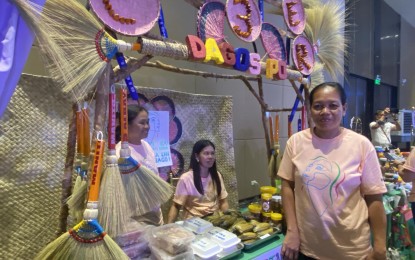
EMPOWERED WOMAN. Angielita Lirio, 43, of Barangay Nagotgot in Manito town, Albay province, is one of the 900 women beneficiaries of Project We-LEAP (Women Empowerment on Leadership in Economics Resources, Access, and Participation) of Fundación Educación y Cooperación (Educo) Philippines. The project promotes and upholds the rights and well-being of women at the grassroots level. (PNA photo by Connie Calipay)
LEGAZPI CITY – For a group of women in the towns of Manito and Camalig in Albay, women empowerment is not just a buzzword.
As beneficiaries of the Project WE-LEAP (Women Empowerment on Leadership in Economics Resources, Access, and Participation) of Fundación Educación y Cooperación (Educo) Philippines, these women are now making great strides in their journey towards financial and social wellbeing.
Economic benefits
Angielita Lirio, 43, of Barangay Nagotgot in Manito town, recalled how trusting her gut made all the difference.
"I used to hear people say that the Bicol Center for Community Development (BCCD) and Educo are nothing but scams. But I didn't believe them because there was just something within me that could sense that these NGOs could help women like me," the mother of seven said in the vernacular.
Despite her husband's initial objection, Lirio doggedly pursued her desire to be part of the organization.
"My husband said I was better off tending to our children than attending meetings," she disclosed with a hint of laughter.
"Before joining the organization, I was a simple homemaker whose job was to take care of our children, do the laundry, and clean. I also sold rice cakes on foot, roaming from street to street to augment the earnings of my husband, who is a farmer but who sometimes works as a laborer," Lirio added.
But after undergoing several trainings and being given capital, Lirio, along with 14 other women in her town, was able to put up a small store selling rice.
From a meager one sack of rice and a PHP10 a day savings, the group now sells five sacks of rice daily.
"Even if the project and the support of Educo and BCCD stop, we will continue what we started in our group. We will show them that the capital that they gave will not be wasted," Lirio said.
Once skeptical about her involvement in the NGO, she said her husband has now become her staunch supporter after seeing the financial benefits.
"This rice business provided to our group is a big help for all of us. Not only are we assured of a fixed monthly income as all the members get a salary for selling rice and attending the store, but we also get a share of the profits made on each kilogram or sack of rice sold," Lirio proudly said.
Social benefits
Aside from economic empowerment, Project WE-LEAP also enables women's agency by building their confidence and unlocking their full potential to become change agents in society.
Joan Murilla Pepaño, 28, another beneficiary from Barangay Caguiba, Camalig, said joining the NGO helped her build her self-esteem and expanded her understanding of women's rights.
"I used to be so hesitant about going out and speaking up, especially in front of a lot of people. But now, I've gained so much knowledge. I've learned how to carry myself confidently and be more assertive. It feels good to be a confident and knowledgeable woman," she said in the vernacular.
More than the financial benefits, the young mother of three said it is the sense of belongingness and camaraderie that has kept her actively involved in the group, despite the initial opposition from her husband.
"Being part of the group gave me the opportunity to connect with people who truly understand me. It provided a safe space where I could discuss things I couldn't talk about before, knowing I'm among people who share similar experiences," she said.
"Now, we are not only making our voices heard in the community; we are also given the chance to meet new people and explore new places. The support from our local officials and the sense of belonging have boosted our confidence as individuals and as a group," she added.
Women empowerment
Lirio and Pepaño are just two of the 900 women beneficiaries of Project We-LEAP. Organized into 61 self-help groups, the project promotes and upholds the rights and well-being of women at the grassroots level.
At the heart of this project funded by the Spanish Cooperation Agency (AECID), is the recognition that sustainable development for women can only be achieved through collaboration.
"Kahit gaano kayaman ng non-government organization na yan (no matter how rich an NGO is), they cannot do all the work among themselves. You need other stakeholders and partners to make it happen. We exist to complement what the government is already doing," Gemma Castill-Goliat, Educo country director, said.
To date, the NGO has been in the Bicol region since 2005. As a global development company, Educo has carried out more than 200 projects in 14 countries and is part of the ChildFund international alliance. (PNA)
